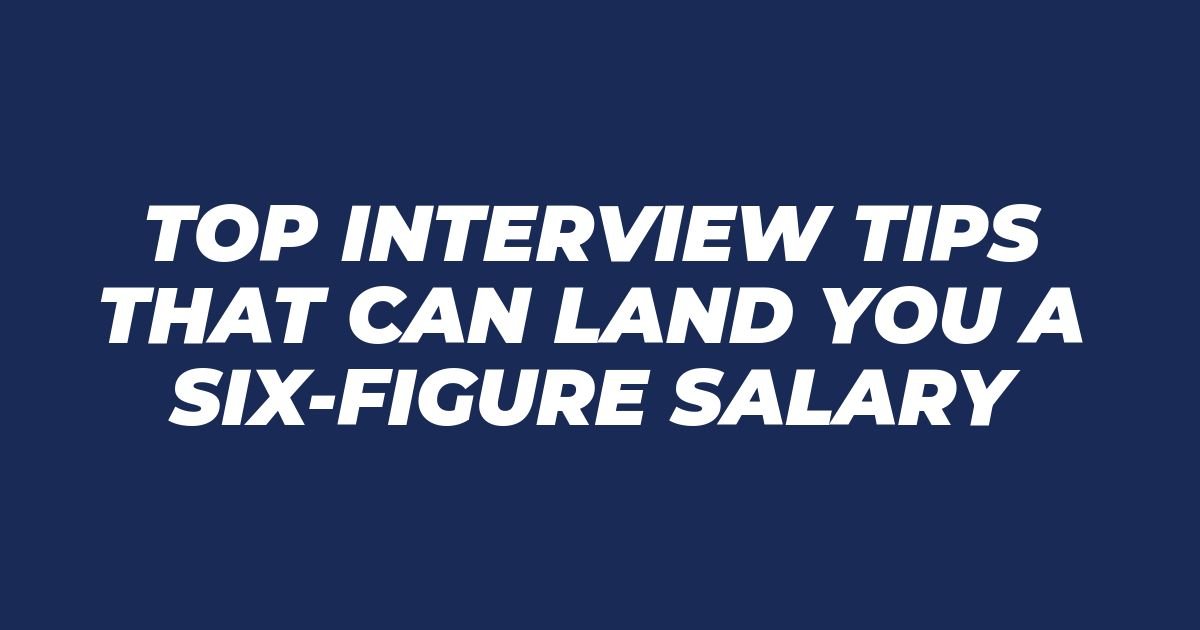Scoring a six-figure salary is a powerful milestone, but it’s also a challenge in today’s hyper-competitive job market. High-paying roles don’t just go to anyone—they’re reserved for candidates who come prepared to prove they belong at the top. Whether you’re aiming to accelerate your career or break into a new sector, mastering these advanced interview tips can help you stand out and secure that coveted offer.
Mastering Advanced Interview Tips for Six-Figure Roles

Photo by Lukas
Breaking into the six-figure salary bracket doesn’t require magic. It calls for strategy, preparation, and a mindset laser-focused on value. Standard interview tips matter, but it’s the extra steps that make the difference for senior or specialist roles.
Research the Company and Industry Thoroughly
Before stepping into any interview—especially for a top-tier role—dig deeper than the basic website overview. Learn about the company’s latest innovations, leadership changes, and industry shifts. This kind of research shows you’re not just another applicant, but a potential insider.
- Check out press releases or annual reports.
- Follow recent news or company blog updates.
- Learn the company’s key products, mission, and competitors.
Knowing this information allows you to tailor your answers in a way that speaks directly to the employer’s needs and vision.
Craft Your Six-Figure Value Proposition
In a world where every applicant lists “hard worker” or “team player,” you must raise the bar. High-paying positions aren’t filled with generic skillsets—they go to those who prove specific, measurable value.
Ask yourself:
- What results have I delivered that others can’t?
- How did my actions boost previous employers’ growth or success?
- Can I summarize my story in one or two bold sentences?
Turn your experience into a sharp, concise “value proposition” that you can insert at the start and end of your answers. For example, instead of saying “I managed a team,” share, “I led a sales team that increased revenue by 38%, turning around an underperforming region within nine months.”
Refine Your Storytelling and STAR Technique
Stories are powerful. Employers remember narratives that demonstrate key abilities. The STAR method (Situation, Task, Action, Result) gives structure and punch to your success stories.
Here’s how to use it for maximum impact:
- Situation: Set the scene.
- Task: Explain your responsibility.
- Action: Describe what you did to fix the problem or reach the goal.
- Result: End on a strong note—what changed because of your work?
Practice short stories that highlight challenges, wins, and lessons learned. They make complex skills easy to understand and showcase your leadership or technical prowess.
Confidence, Executive Presence, and Body Language
Executive roles or six-figure specialist jobs expect more than polished resumes. Projecting confidence and authenticity can matter as much as your answers. Most senior interviewers pay attention to:
- A steady, relaxed tone of voice.
- Warm, direct eye contact.
- Firm handshake and upright posture.
- Calm, purposeful gestures and controlled breathing.
Pay attention to what your body “says” even when you aren’t speaking. Practicing with a friend or coach can help you polish these subtle, high-impact signals.
Advanced Preparation and Smart Negotiation Strategies
Landing a six-figure offer isn’t just about impressing in the interview room. Elite candidates prep for every curveball and negotiate wisely when it counts.
Prepare for Behavioral and Technical Assessments
Many top-tier jobs involve more than face-to-face interviews. Expect behavioral questions to gauge cultural fit and real-world scenarios. For technical roles, prepare for live case studies, skill tests, or simulations.
Practice sample questions covering big projects, difficult coworkers, or tough deadlines. For technical interviews, review recent work, whiteboard out loud, and brush up on new trends relevant to the role.
Mastering Questions for the Employer
Asking strong questions isn’t just polite—it’s expected for high-paying jobs. Use your research and curiosity to inquire about:
- Leadership philosophy and company culture.
- Major goals or challenges on the horizon.
- How success in the role will be measured.
These show both your business acumen and serious commitment. Employers want thinkers, not just doers.
Negotiation Skills for Securing Six-Figure Offers
When the offer lands, preparation matters more than ever. Don’t just accept what’s offered—leaders and high earners negotiate thoughtfully and respectfully.
Do your homework by checking sites like the Harvard Business Review’s 15 Rules for Negotiating a Job Offer or the salary negotiation tips from Indeed. Know the market rate for your skills and location, but also be ready to justify why you belong at the top of that range.
When discussing pay:
- Highlight rare or high-impact achievements.
- Present evidence of market value and competitive offers, if any.
- Be open about total compensation—bonuses, benefits, flexibility—not just the number.
A calm, well-reasoned negotiation often leads to better offers and more respect.
Professional Follow-Up and Building Long-Term Relationships
Your interview doesn’t end when you walk out the door. Send a well-crafted thank-you note within 24 hours. Reference something discussed in the interview to keep it personal.
Maintaining a positive, professional relationship can help for future roles (or even referrals). Keep in touch with recruiters and interviewers on platforms like LinkedIn, and send occasional updates if your situation changes.
Conclusion
Breaking into the six-figure salary bracket demands more than just strong interview tips—it takes deep research, a compelling story, strong presence, and the ability to negotiate a total package. By following the strategies above, you’ll not only stand out from the crowd but set the stage for continued advancement. Take these tips, practice them before your next big interview, and get ready to land the role and salary you deserve.

